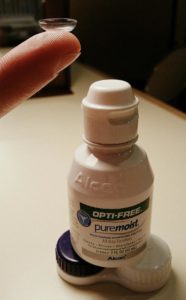
Top Tips for Contact Lens Care
By: Nathan Klein, O.D.
August 21-25, 2017 marks the Fourth Annual Contact Lens Health Week.
Roughly 85% of Americans who wear contact lenses do not care for them properly. Contact Lens Week was instituted to help bring awareness to proper contact lens wear and care.
Let’s start with some demographic facts about who wears contact lenses:
- More than 30 million people in the US wear contact lenses
- About two thirds of contact lens wearers are women.
- Roughly 10% of wearers are under 18, 15% are 18-24 years of age, 50% are 24-44 years old and 25% are 45 and older, with the average age being 31.
What is proper care for all types of contact lenses?
- Always wash your hands with soap and water before putting in or taking out your contacts and dry fully. This will ensure that no bacteria gets from your hands or from the water into your eyes.
- Unless prescribed to do so, never sleep in your contacts! Sleeping in your lenses puts you at 6-8 times higher risk for getting an eye infection called keratitis, an infection of the cornea.
- Avoid getting water in your eyes when wearing contacts. That means do not shower, swim, bathe, or relax in a hot tub, etc. with your lenses in. There is a microorganism called acanthamoeba which is found in water that can cause a blinding eye infection.
Different contact lenses are on different replacement schedules. Some need to be replaced daily (my personal favorite), some every two weeks, and some monthly.
Non-daily lenses require additional care:
- When you remove your contacts, rub and rinse the lenses with multipurpose solution before putting them in the case. It is imperative to actively remove the deposits and microbes before putting the lenses in the solution for the night.
- Store lenses in fresh multi-purpose solution for the night, never in water or any other liquid.
- Empty the case of the old solution every morning and turn over, allowing the case to air dry.
- Make sure to replace your old case every three months.
Just a final reminder.
Many contact lenses have UV protection. But the protection is not sufficient coverage to prevent eye damage from the sun. Proper sunglasses are a must, particularly in South Florida where we enjoy the sun’s rays all year.
It’s a tradeoff. Isn’t a pair of polarized sunglasses with 400 UV protection a small price to pay for the Florida lifestyle.
